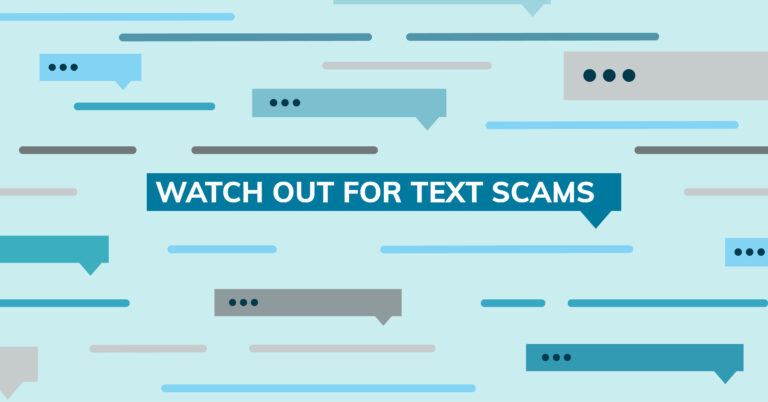Weather Alert: West Bank branches and ITM services may have delayed openings due to inclement weather. Please check back for updates.
Weather Alert: West Bank branches and ITM services may have delayed openings due to inclement weather. Please check back for updates.
Weather Alert: West Bank branches and ITM services may have delayed openings due to inclement weather. Please check back for updates.

According to the Federal Trade Commission in 2024, consumers reported losing $470 million to scams initiated with text messages. This staggering number is five times higher than the amount reported in 2020. Below are the five most common types of text message scams.
Messages about package deliveries typically come from someone pretending to be with the U.S. Postal Service or other delivery services. They will typically provide a link to a fake site where you will pay a small “redelivery fee” in which they can gain access to your credit card information or Social Security number.
Scammers pretend to be recruiters saying you are the perfect fit for an online job earning a lot of money with little to no effort. These “jobs” are fake and usually end up asking you to send some money to finish your tasks or to guarantee your paycheck. Do not respond to these messages. If it sounds too good to be true, it probably is too good to be true.
Did you receive a text message claiming there was a large transaction on your account telling you to reply with YES or NO to verify it? This text message scam may even escalate the situation by saying all your accounts and money are at risk. The scammer claims he needs your account information to protect your finances. Once they receive that information, they can drain your account.
Some impersonators pretend to be from highway toll programs from all over the country. They request payment of an unpaid balance by clicking a link. These charges, as well as the message, are not legitimate. In this scam, criminals are attempting to obtain your credit card information or even your Social Security number.
You may have received an innocent looking text saying “hello” or “do you want to get dinner later?” These seemingly harmless text messages are sent by people trying to form a fake friendship, often with romantic undertones. After forming a relationship, they claim to be successful investors who want to share their advice with you by getting you involved with a phony investment platform.
West Bank may send you informational text messages if you have signed up for text message alerts. Furthermore, West Bank may send you text message verification codes for online banking services as a part of our multifactor authentication process. West Bank will never ask you to share this verification code, and you should never share the code with anyone who requests it. Additionally, West Bank will never text you requesting your account information or ask you to log in to your account with a provided link.
Keep these tips in mind when analyzing a text message.
You can report text message scams in a variety of ways.
Share This Article
West Bank is not responsible for the content or policy on this hyperlinked website. West Bank does not represent you or the hyperlinked website, should you enter into a transaction. This link is provided for your convenience. Would you like to continue?